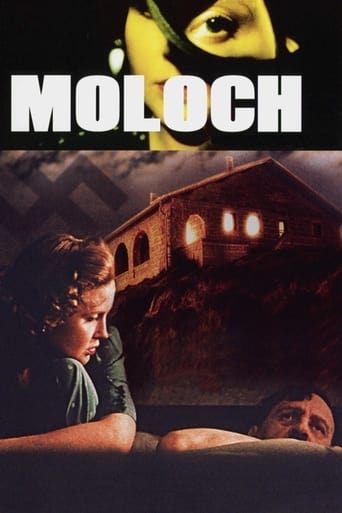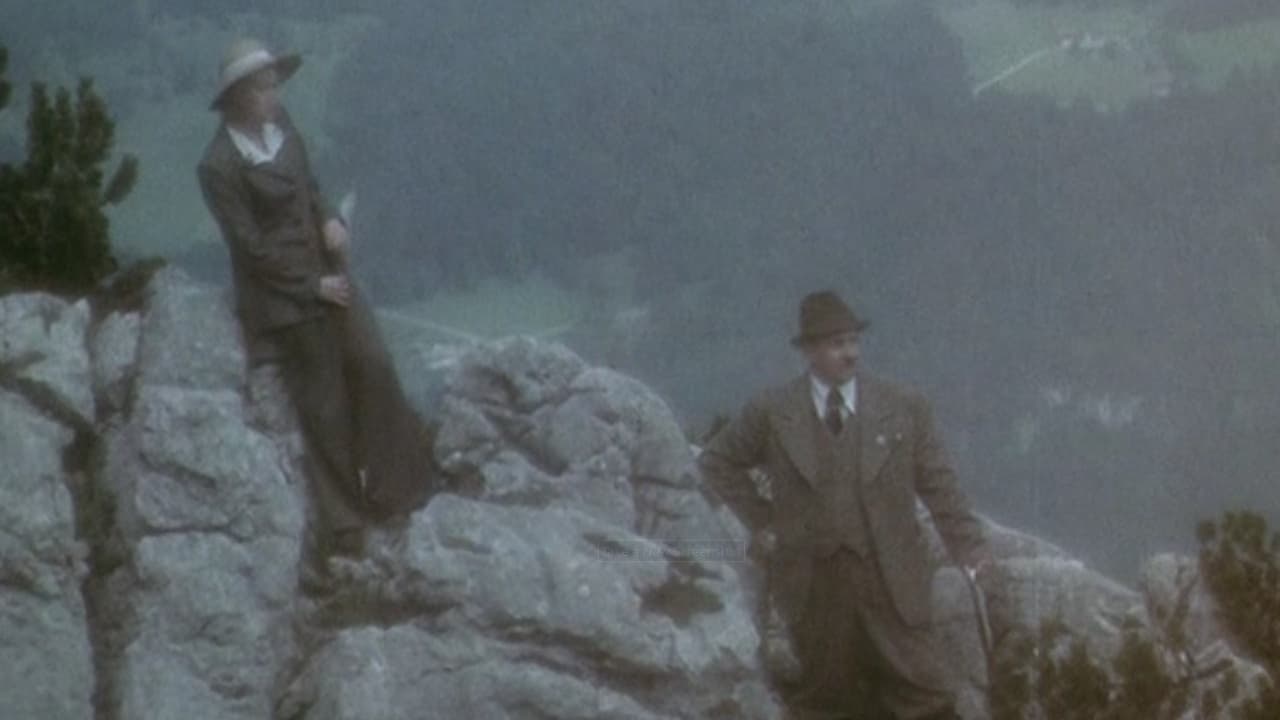oOgiandujaOo_and_Eddy_Merckx
Sokurov I think was despondent at humanity's attempts at progress in the twentieth century. Molokh takes place in a surreal dream of the Berghof, and features Hitler, Eva Braun, and his coterie or should I say grotesquerie of sycophants. Progress is what Sokurov has been concerned by, so no need to pay too much attention to whether the film is accurate or not, it's probably beside the point.Sokurov had made rather a similar film a decade before, Skorbnoye beschuvstviye (Mournful Unconcern), his adaptation of George Bernard Shaw's Heartbreak House. It again is about a group of pathetic individuals who inhabit a mist-bound palace whilst the world crumbles around them. The black swamp and masked man of the prior film here is replaced by black soup and black puppies. I think that perhaps both films show the huge might of German ingenuity being harnessed by cretins. The inhabitants of the house in Mournful Unconcern represented the English upper class, who rowed their boats merrily down the stream instead of participating in the reform of an outdated Europe, gearing for war. Inaction is again the point in Molokh, how did a great nation allow itself to be ruled by a bore, a man who failed to recognise the rights of others, failed to understand the feelings of others, a fantasist, a sadist, and a self-lover? The movie portrays them as nothing less than big kids, Bormann hasn't even learnt how to sit on a chair. Braun and Hitler chase one another around a table and hold doors closed on one another, all of which is very reminiscent of my life circa aged twelve. I ended up feeling rather sorry for them in their airy castle, blown by draughts and tortured by psychological complexes. I was also wondering why on earth people feel such a need to be controlled. Sokurov seemed to have got even darker here than with Mournful Unconcern, providing hardly any contrast against what is progressive.
gradyharp
MOLOCH (translated as 'a demon in the shape of a man') is a film that shows yet another aspect of Aleksandr Sokurov's approach to film-making. As in his splendid 'Russian Ark', 'Mother and Son', and 'Father and Son' he manages to say more in his silences and interplay of his characters with nature and their environments that in his spare scripts (this script is by Yuri Arabov and Marina Koreneva). His movement is slow, like an adagio, his eye is constantly on symbolism and irony, and his filming/camera technique is always experimental. Given these factors 'MOLOCH' is a fine example of how Sokurov works his magic: whether or not the viewer will relate to this bizarre film depends on how willing one is to enter Sokurov's vision. This film about Hitler is very much a Russian product and given the history of the relationship between Russia and Germany, that fact is necessary to know.1942, in a fortress in the clouds of Bavaria, we find Eva Braun (Yelena Rufanova) cavorting balletically both inside the foreboding stone 'dungeon' and out on the dangerous parapets. She is visited by a strange entourage: Hitler (Leonid Mozgovoy), Dr. and Mrs. Goebbels (Leonid Sokol and Yelena Spiridonova), Martin Boorman (Vladimir Bogdanov), and a priest (Anatoli Shvedersky). The action takes place in a single day and during this time the actual war is not discussed. We are to understand this is a retreat for relaxation, but as we get to know the characters we find that many hints of the evil and insane minds of all of them. They talk: Auschwitz is mentioned and Hitler apparently has never heard of it; Hitler pontificates on power; the Goebbels demonstrate their abject worship of Hitler; Eva Braun is the sassy journalist who is the only one who can talk back to Hitler, teasing, seducing and acquiescing to his inability to demonstrate intimacy. They dine (Hitler's vegetarian mentality deplores the 'corporal soup' his dinner partners devour), they watch old grainy black and white news clips of war machines, new tanks, soldiers, and oddly a performance of Beethoven's 9th Symphony with Knappertsbusch conducting. Then the guests retire, and Hitler is joined by Eva Braun in a bizarre boudoir scene. In the morning the entourage leaves and Eva remains, retuning to her strange world of dancing through the fortress.Throughout the film the music is that of Wagner - Siegfried's Funeral Music, and other passages from 'Die Götterdämmerung' (Twilight of the Gods!) accompanied by some banter about Furtwangler and Bruno Walter as well as Knappertsbusch. The acting is somewhat stylized which adds to the bizarre mood the story creates. In the final analysis this appears to be Sokurov's image of a mind gone mad with power and visions of immortality and it is only at the very end when Eva Braun whispers that he cannot defeat death that there is a moment of vulnerability in the historical Hitler.This is a slow moving 108 minutes of film and not for everyone's taste, but if you are an admirer of Aleksandr Sokurov it is a mesmerizing journey through the cerebral passages of one of history's worst molochs. Grady Harp
Claudio Carvalho
In 1942, in Bavaria, Eva Braun (Yelena Rufanova) is alone, when Adolf Hitler (Leonid Mozgovoy) arrives with Dr. Josef Goebbels (Leonid Sokol) and his wife Magda Goebbels (Yelena Spiridonova) and Martin Bormann (Vladimir Bogdanov) to spend a couple of days without talking politics. What a great deception this "Molokh" is ! Winner of the Golden Palm in screenplay in Cannes Festival, I really expected a great film. However I found a very boring and pretentious movie, too much slow paced and going nowhere. The title refers to an evil divinity adored by ancient pagan cultures, and shows a ridiculous Hitler in his intimacy with Eva Braun, his hypochondria and crazy speeches about human races, life and death, and a rebel Eva Braun being the unique person to contest his words. I did not like this fictional movie, the story, the screenplay, the direction and the performances. My vote is three.Title (Brazil): "Moloch"
taylor9885
Yes, it would be easy to criticize Molokh for being slow, and for having Russian actors mouthing German words that aren't natural to them, but I found this film to be fascinating through most of its length (and if Tarkovsky had made it, it would have been TWICE as long).What we see is Hitler and his inner circle being jovial and vicious by turns, along with loopy discussions of racial characteristics (Czech men have droopy mustaches, indicating moral turpitude; the Finns are rendered mentally unfit owing to cold weather, etc.) There is a lot of backstabbing going on between Bormann and Goebbels; pity that Goering isn't in the film--we would have benefitted even more from his cynicism. All of this has the ring of truth--I recently read Speer's memoirs, Inside the Third Reich, which has detailed accounts of these lunch and dinner talk-fests.Yelena Rufanova is not convincing as Eva Braun--too slavic looking--but Leonid Mozgovoy with his dumpy body is great as Hitler. The hypochondria, the refusal of middle-class pleasures--no slippers!--the insane political musings: it's all here. Leonid Sokol is Goebbels, absolutely. The rat face on a dwarf's body, the desperate ridicule of Bormann whom he knows is cutting him down: this is fine acting.Sokurov adopts Leni Riefenstahl's style to tell a Wagnerian story of grandeur and collapse.


 AD
AD
